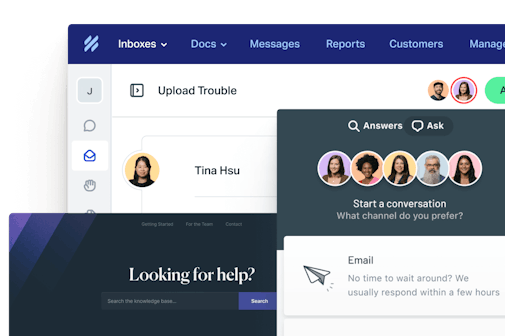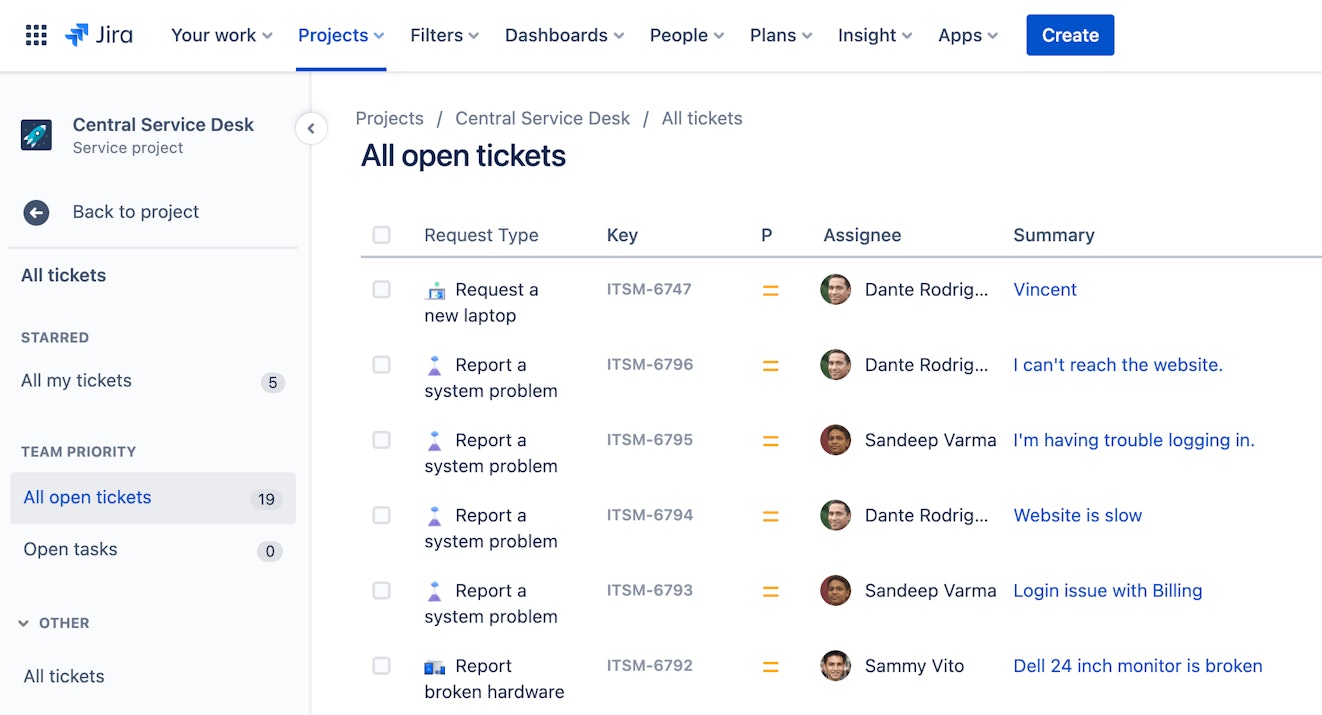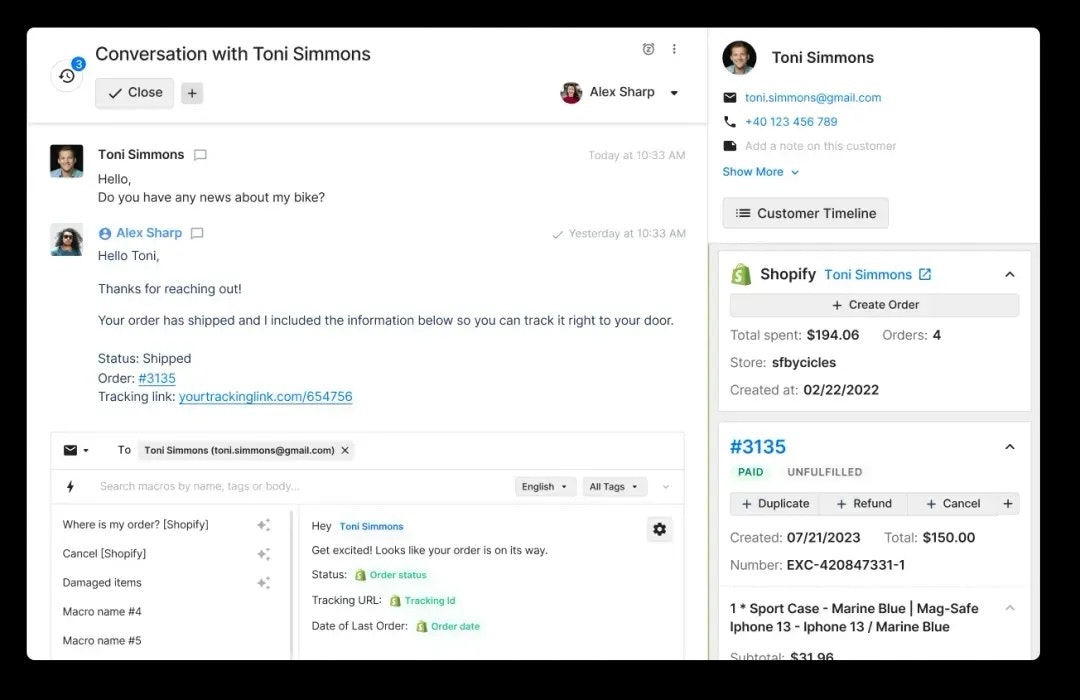Managing customer and client communications as a growing business is tough.
Standard email clients like Gmail and Outlook don’t have the features necessary to provide quality support, but finding the right communications platform for your team can be overwhelming and expensive.
While it may be tempting to bury your head in the sand, you shouldn’t wait to make a change. Poor support experiences can cause a breakdown in trust between you and your clients and can have a lasting impact on your brand.
If standard email clients aren’t working for your team anymore, it might be time to seek a dedicated tool like a web-based help desk.
What is a web-based help desk?
To answer this question, we first have to start by defining the term help desk. A help desk is software that enables teams to manage customer or user communications more effectively. It does this by turning the contact — email, phone call, live chat message, or social media mention — into a ticket that you can use to track the request through to resolution.
Help desks perform this task more effectively than typical email because they are full of additional features that aren’t available as part of a standard email client. For instance, a help desk will include collaborative tools that make it easier for teams to manage messages as a group and reporting dashboards to help measure ticket volume and agent productivity.
Like email clients, help desk software can be web-based or self-hosted. Web-based help desks are what is known as a software as a service, or SaaS, offering. This means that the help desk company hosts the software and all user data on its servers. Then, to access and use the service, users pay the company a subscription or licensing fee.
Alternatively, with a self-hosted or on-premise help desk, the user pays a one-time fee to download the software to their servers. From that point, the software runs on the user’s system, keeping all stored data within their control.
While there are benefits to both approaches, web-based solutions are easier to deploy and maintain, making them excellent choices for those just getting started with a ticketing system.
The 10 best web-based help desk software options for growing businesses
A good way to understand the benefits of using a help desk is to learn more about the features of different help desk platforms. Here are ten web-based help desk options to help get your team on the road toward better customer communications.
Help Scout
Jira Service Management
Salesforce Service Cloud
Kustomer
Zendesk
Front
Dixa
Gorgias
HelpSpot
Spiceworks
1. Help Scout
Best web-based help desk for small businesses and growing teams.
Founded in 2011, Help Scout is a communications platform that helps businesses and organizations have more effective conversations with their customers, clients, and communities.
The platform centers around a shared inbox that enables teams to provide quality support via email, live chat, and a customizable knowledge base. The software is full of features that ease the burden of support, including:
Assignments: Assign conversations to specific employees or teams to help better distribute your team’s workload and get each request in front of the right person.
Saved replies: Create a library of responses to FAQs that you can insert into any email or chat reply with just a couple of clicks.
Private notes: Use private notes to keep discussions regarding customer issues inside the conversation and avoid confusing forwarded email threads.
Collision detection: Let everyone on the team know when someone is viewing or working on a conversation with collision detection features.
Workflows: Automate repetitive tasks like ticket assignments and tagging by building customized workflows.
Integrations: Provide agents with more context by integrating platforms your company already uses and loves, like CRMs and ecommerce tools.
Reporting: Evaluate your support volume by channel, busiest hours, and trending topics with customizable reporting dashboards.
Based on these features alone, it’s clear that switching to a help desk like Help Scout is a better choice than sticking with standard email. In addition, here are three reasons you should consider Help Scout over a self-hosted help desk:
1. Help Scout is accessible, with a gentle learning curve.
Unlike a self-hosted solution, a new Help Scout account can be up and running within an hour, and your team members can be power users within a week. No one on your team needs to be a software or data security whiz; Help Scout is accessible to everyone.
2. Help Scout cares about your success.
Help Scout offers blog posts, help docs, live classes, and an amazing customer support team that is ready to jump in and do everything possible to enable your company’s success. Self-hosted software may have a customer service department, but ultimately, it’s up to you to take the lead in setup, maintenance, and troubleshooting.
3. Help Scout has the features you need at a price you can afford.
Self-hosted help desks require a big financial commitment right out of the gate. Software cost aside, having a dedicated team to facilitate self-hosting can be a prohibitive entry point for small businesses.
Price: Free trial available. Plans start at $22/user per month.
2. Jira Service Management (formerly Jira Service Desk)
Best web-based help desk for IT teams.
Popular with information technology (IT) teams, Jira Service Management gives your team everything they need to provide web-based IT support. Users submit requests through customizable forms on a dedicated service portal or via other channels like email or live chat. Once in the system, tickets can be triaged, assigned, and tracked to resolution.
Key features:
Self-service portal with customizable forms.
Ability to manage email and live chat requests.
Knowledge base builder.
Automation capabilities.
Asset, incident, and change management tools.
Reporting and analytics.
Price: Free trial and plan available. Paid plans start at $21/agent per month.
3. Salesforce Service Cloud
Best web-based help desk for teams that use Salesforce’s Customer 360 CRM.
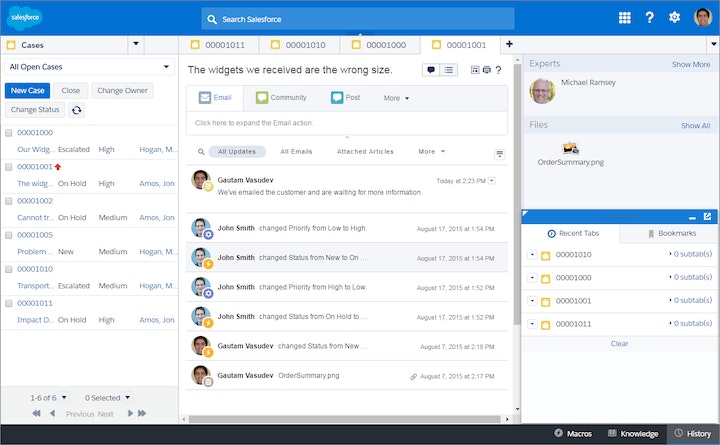
Service Cloud is a web-based help desk that can help teams manage support requests across channels like email and voice. The teams who can benefit most from using Service Cloud are those who already subscribe to the Customer 360 CRM. Having a seamless integration between your CRM and help desk will allow for a better understanding of your customers, empowering your team to provide more personalized experiences.
Key features:
Omnichannel help desk ticketing and routing.
Knowledge base builder.
Automation and artificial intelligence (AI) features.
Service contract (maintenance, warranty, subscription, etc.) and order management functionality.
Add-on features such as field service and digital engagement tools.
Integrations with popular platforms and applications.
Customizable reports.
While Service Cloud has many great functions, the platform offers what seems like an infinite amount of features and add-ons, which could be overwhelming to potential customers.
Price: Free trial available. Plans start at $25/user per month.
4. Kustomer
Best web-based help desk for managing omnichannel conversations.
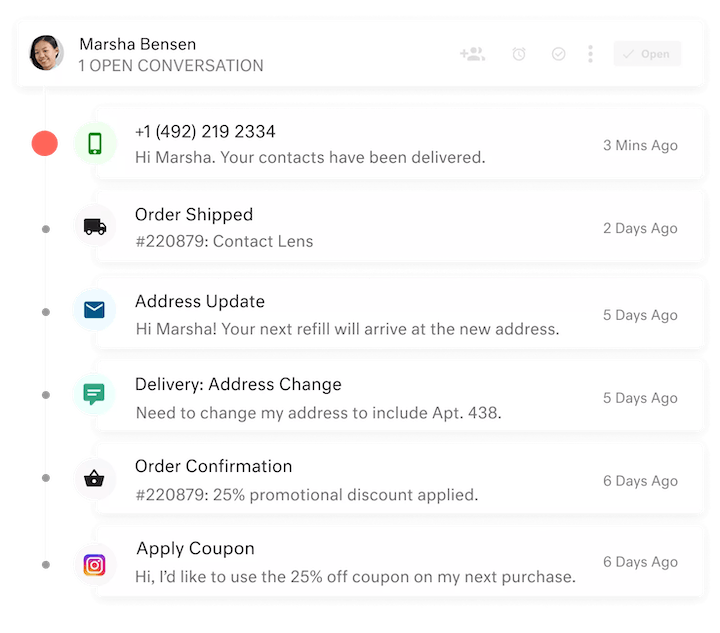
Recently acquired by Facebook’s parent company, Meta, Kustomer is a cloud-based help desk ideal for those who need to track requests across multiple channels. The platform utilizes a timeline format that displays all customer interactions in a threaded chronological view. When an end-user needs to jump from live chat to email, agents can easily continue the conversation without juggling multiple tickets.
Key features:
Customer timeline view.
Omnichannel support (email, forms, live chat, voice, SMS, social messaging, and self-service).
Macros and collaboration tools.
Knowledge base with multi-language support.
Automation and AI features.
Reporting dashboards.
Integrations with popular apps and services.
Price: Free trial available. Plans start at $89/user per month (four seat minimum).
5. Zendesk
Best web-based help desk for enterprise teams.

Zendesk is a powerful web-based communications platform that needs little introduction. The omnichannel tool contains features that simplify support handling, like ticket assignments, internal notes, custom views, macros (email templates), and opportunities to automate routine tasks. It can also integrate with more than 1,000 third-party applications like CRMs and ecommerce platforms, providing additional context to every conversation.
Though Zendesk has plans for every budget, the learning curve for the platform can be steep. Much like a self-hosted help desk, you may need dedicated staffing resources for implementation, deployment, and upkeep.
Key features:
Self-service customer portal.
Ticketing system supporting email, voice, chat, and SMS.
Collaboration tools like shared views, macros, internal notes, and ticket assignments.
Knowledge base builder.
Community forums.
Automation and AI capabilities.
Integration with 1,000+ third-party applications.
Custom reporting dashboards.
Price: Free trial available. Plans start at $19/agent per month.
6. Front
Best web-based help desk for teams that need a calendar integration.
Like other platforms on this list, Front makes it easy to manage multiple channels like email, chat, and social media from a universal inbox. One thing that makes Front a bit different from other help desks is that you can also manage your personal email and calendar within the tool. This means that you can set up meetings with one click and automate actions, not just in team inboxes, but within your personal inbox as well.
Key features:
Universal inbox, bringing team and personal email, chat, social media, and SMS into one place.
Collaboration features, including conversation assignments, shared drafts, and private notes.
One-click meeting scheduling.
Automated workflows.
Reporting dashboards.
Price: Free trial available. Plans start at $19/person per month (two user minimum).
7. Dixa
Best web-based help desk for intelligent ticket routing.
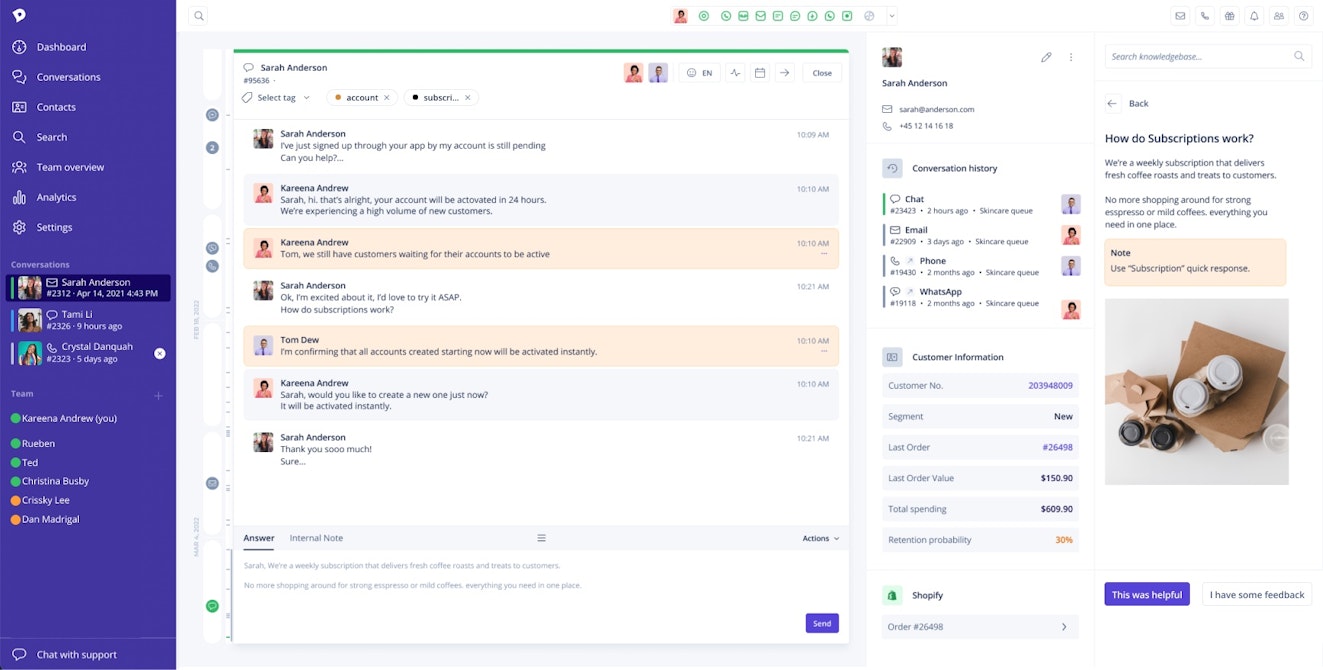
While most help desk platforms revolve around a shared inbox, Dixa handles assignments a little differently. When customer conversations come in, Dixa automatically routes them to available agents, then gives the team the ability to “accept” or “reject” the request. The routing can either be random or based on your company’s priorities, and it ensures every customer receives a prompt response.
Key features:
Native support for email, live chat, phone, Facebook, WhatsApp, and Instagram.*
Intelligent routing.
Knowledge base builder.
Reporting and analytics dashboards.
Integrations with CRMs, ecommerce platforms, and more.
* Starter plan only supports the Dixa messenger channel.
Price: Free trial available. Plans start at $39/agent per month (five seat minimum).
8. Gorgias
Best web-based help desk for ecommerce companies.
If you’re looking for a web help desk that specifically caters to ecommerce companies, Gorgias is a good place to start. The system has a deep integration with Shopify, allowing your team to view, edit, return, and start orders from within the conversation window. This prevents the need for having to switch between tools and can be a huge time saver for teams supporting online retailers.
Key features:
Shared workspace capable of supporting email, live chat, phone, SMS, and social messaging.
Macros (email templates) for quick replies.
Automated workflows and basic AI capabilities (intent and sentiment detection, instant answers, etc.).
Knowledge base builder.
Reporting and live statistics.
Ticket-based pricing structure.
Price: Free trial available. Plans start at $10 per month, using a ticket-based pricing structure.
9. HelpSpot
Best web-based help desk for teams who only provide email support.
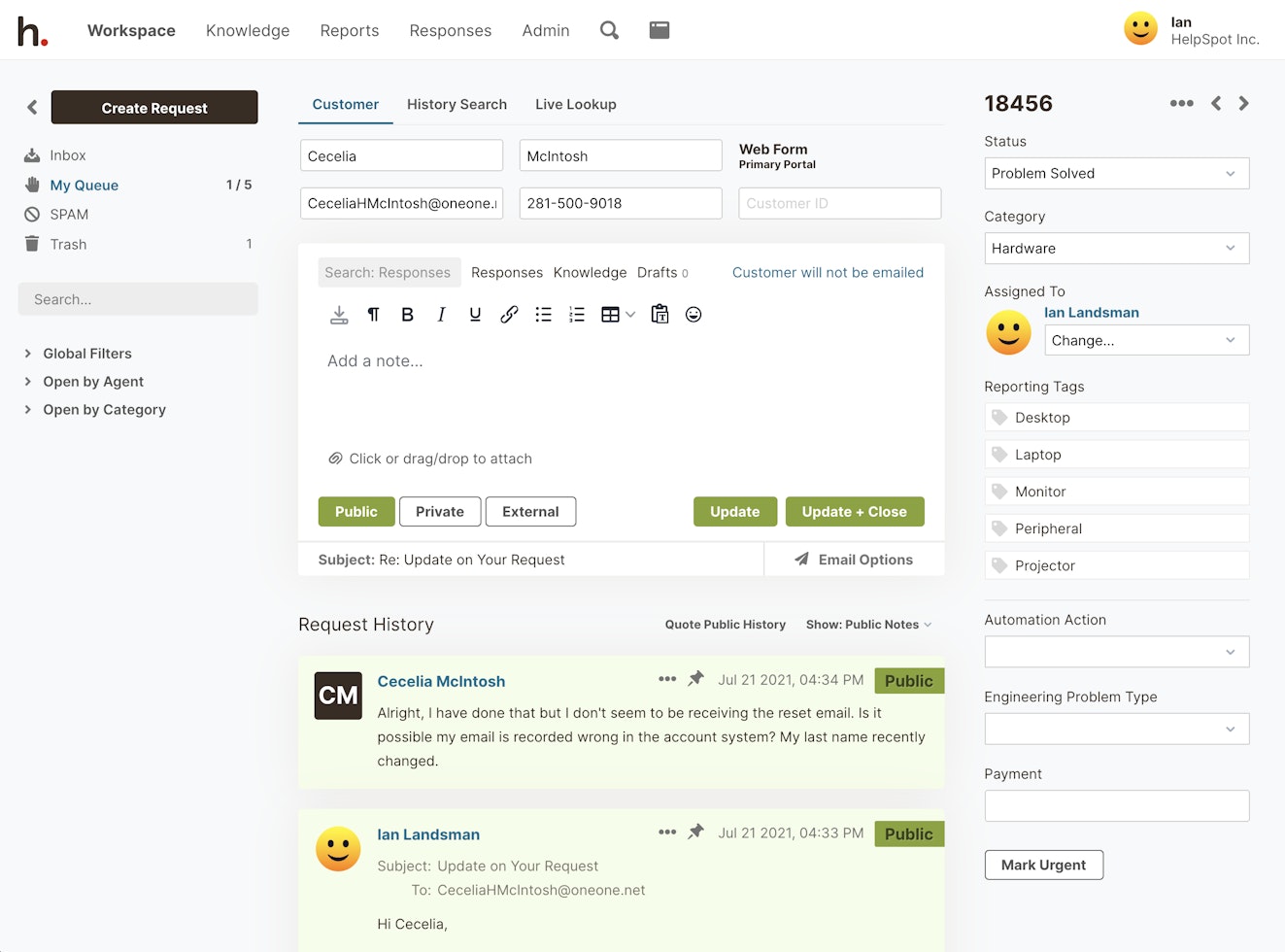
HelpSpot is a help desk platform that provides both a cloud and an on-premise option for their software. Both paid software versions are the same price, though you can download a limited version of the self-hosted software for free.
Some may view HelpSpot as a little bare-bones, given that the UI is simple and the platform can only handle email. Still, if you don’t need the other channels, HelpSpot has all the features necessary to provide collaborative email support, like reusable responses, real-time collision detection, ticket assignments, and full customer histories.
Key features:
Self-service portal.
Shared inbox for email and contact form channels.
Saved responses and collision detection.
Time tracking feature.
Knowledge base builder.
Reporting dashboards.
Automated workflows.
Some integrations available via Zapier and other tools.
Price: Free trial available. Plans start at $19/agent per month (for up to three agents).
10. Spiceworks
Best free web-based help desk for IT teams.
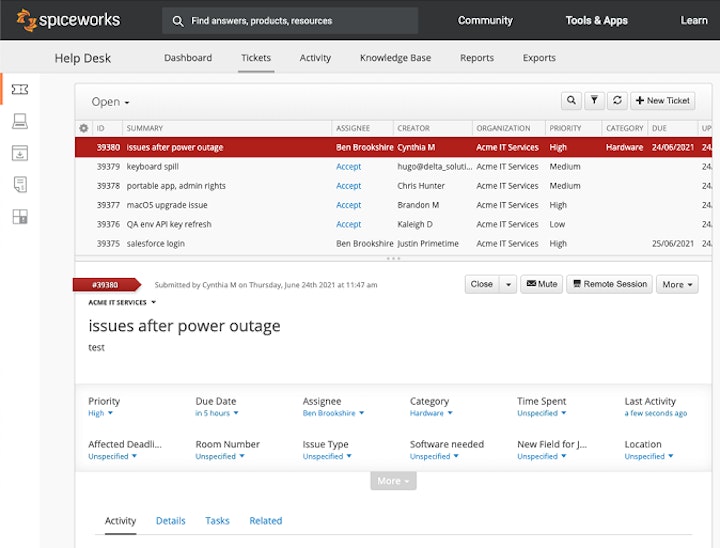
Spiceworks is a no-frills IT help desk. It’s capable of handling basic email and ticket form contacts as well as asset management. While it may not have all of the bells and whistles that many tools on this list have, you can’t beat the price — free.
Spiceworks keeps its software free through in-app advertisements, though they aim to keep them relevant and helpful. In addition to the attractive price tag, Spiceworks also has an active support forum. Many users enjoy the sense of community the forum brings, and having someplace to turn when learning how to navigate the software can be helpful.
Key features:
Self-service portal.
Shared inbox for email and contact form channels.
Ticket assignments and statuses.
Ticket rules for automatic assignments.
Private comments.
Asset management tool.
Basic reporting features.
Price: Free
What are the advantages of implementing a web-based help desk?
Now that you’ve seen some web-based help desk options, let’s look at why customers choose a SaaS ticketing system over a self-hosted platform.
Ease of deployment
With a web-hosted solution, all you need is an internet connection, a web browser, and basic computer skills, and you’re ready to go! If you get stuck during setup, run into problems during usage, or are looking for guidance on how to customize your account, the service provider will be able to help.
Self-hosted help desks require hardware, infrastructure, technical know-how, and a dedicated team to deploy the software and keep the ship afloat long term. In addition, when bugs and technical hiccups ultimately arise, your team will need to lead the recovery efforts.
Flexibility
Web help desks operating under a SaaS model provide a lot of flexibility. Beyond a free trial period, most allow you to pay month to month, meaning that at any point you can switch plans, tweak feature options, or even switch to another platform as your company's needs evolve.
Web help desks also allow your team to access the software from anywhere. Depending on their implementation, some self-hosted options may be limited to on-premise use or require the use of a VPN for remote access. A web solution will always be available to your team, regardless of location, and it doesn’t require anything beyond an internet connection and a web browser for access.
Another area where on-premise options may be more rigid than a web-based solution is that once you buy a self-hosted option, you may feel stuck with it. The upfront expense is high, and even if you’ve chosen to go the open-source (i.e., free software) route, the amount of money put into an initial deployment can make teams resistant to switching to another platform.
Cost
Web-hosted help desks are less expensive than self-hosted options. Most platforms offer tiered pricing plans that allow you to only pay for what you need, and some companies even offer free options for those just getting started with communications management.
Paying out a lump sum for a self-hosted help desk or opting to use an open-source option may seem attractive, but as mentioned above, the cost of a dedicated team can wipe out the financial benefits.
Should you choose a web help desk over a self-hosted option?
While enterprise teams with large IT departments may be better off choosing an on-premise option, the best choice for most teams is to select a web-based help desk like the options discussed above.
However, as you start your search, remember that not all help desks are created equal. When you choose a SaaS platform for your help desk, you’re putting tremendous trust in that company. You rely on them to provide a stable platform, be responsive when issues arise, and keep your customers’ data safe. It’s a big deal!
Utilize the free trials mentioned in this article, chat with the support teams for platforms you’re considering, check out online reviews, and, if you’re interested in Help Scout, sign up for one of our live product walkthroughs — we’d love to see you there!




